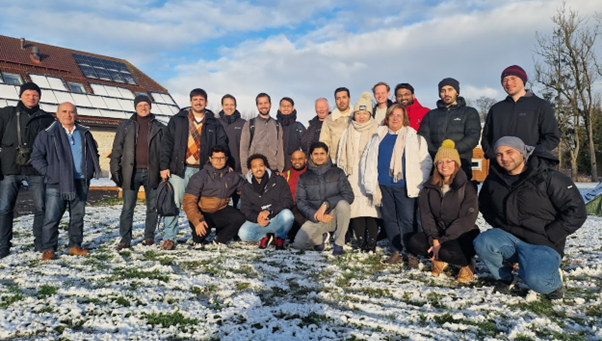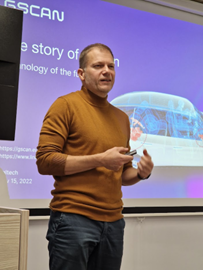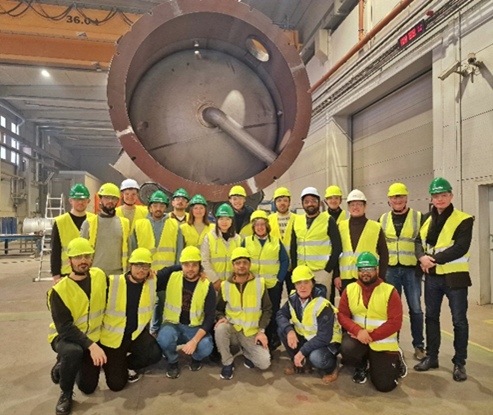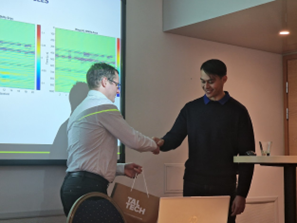This blog post was written by Omar, a Engineering PhD student at TalTech.
I am Omar, a PhD student in Engineering enrolled at Taltech. Simultaneously, my PhD project belongs to an European research-consortium Guided waves for Structural Health Monitoring (GW4SHM). The main goal of the GW4SHM is to train the next generation of researchers to cope with the existing and upcoming challenges in the field of Structural Health Monitoring (SHM) by Guided waves-based approaches. Besides the 14 PhD students working at different universities and companies, we have had 5 training events over the past 3 years. Unfortunately, the first 2 training events were online due to travel restrictions caused by the COVID pandemic. However, for the last 3 training events, travel restrictions were eased, that gave us the opportunity to meet in person in London, Paris, and Tallinn.

The last training event was hosted by TalTech, at this time the GW4SHM consortium had a deep insight into the theory and applications of SHM techniques based on guided waves, because each training event consisted of a series of state-of-the-art seminars, workshops, and on-site visits to research facilities, each training event was unique, and we took out the most of each location, but …. What is science & research without investment and funding? That is something we found out during our time in Tallinn!
At this point, every previous training event was unique and contrasted very well with the hosting country, and the training at Tallinn wasn’t different. The event lasted 5 days, and it consisted of a series of technical seminars, on-site visits, and social events.
We started our seminars with an enriching introduction about Estonia given by Sandra Rebane, on behalf of the International House of Estonia. She talked mainly about the life’s quality, culture, job opportunities and strengths of Estonia, such as Estonia is one of countries with more start-up per capita and E-government. This talk put Estonia into considerations for my colleague’s feature careers, because they saw there are cool things happening in Estonia, isn’t it?

Then, we had a series of technical seminars. One of the most unique seminars was given by Andi Hektor, founder of G-Scan technologies. G-Scan is a growing startup based in Estonia, and they are pioneers in Atmospheric Ray Tomography that is the new frontier of particle physics applications, with tremendous practical potential for customs, public safety, industrial, medical, and space-based applications. Andri’s talk was inspiring to most of the attendees, because he found a practical application for a complicated physics’ concept, and on top of that, he commercialized it!
Regarding technical seminars, we also visited ESTANC. ESTANC is dedicated to the design and production of industry equipment’s such as vessels, heat exchangers, towers, etc. We spent a day at ESTANC learning about their designing processes and visiting their workshop near Tallinn. At first EASTANC might look like a small local company but, to our surprise, ESTANC is present all over the world!
local company but, to our surprise, ESTANC is present all over the world!
On the other hand, in our previous events we had soft-skills workshops such as writing for publication, training in guided-waves, etc. However, in Tallinn we had a very dynamic and energetic workshops in how to create a startup and pitching, given by Mairy Tiido. Most of the time, researchers are focused on science and carry out research, but nothing else (which was the case for most of us), however these workshops were a mind opener! Because it helped us to see our research as a potential business idea. Moreover, at the end of the week, we had a pitching competition where each of the student pitched our research topics as we were asking for funding or investment! At first, we were nervous and reluctant about it, but at the end, we all enjoyed the pitching competition and feedback. If you are studying in Tallinn, and you have been in any start-up related event, you have taken Mairi’s pitching training! (or you eventually will).

Finally, I would like to mention that the organization of the training event was smoothly because the organization committee (including me) knew beforehand most of the speakers! Although Estonia is a small country, it enhances your network! So, it is easier to be connected and build up collaborations between institutions, isn’t that great?
Acknowledge of funding entinty: Omar’s PhD is founded by the European Project Guided Waves for Structural Health Monitoring (GW4SHM) (H2020-MSCA-ITN-2019-860104).
